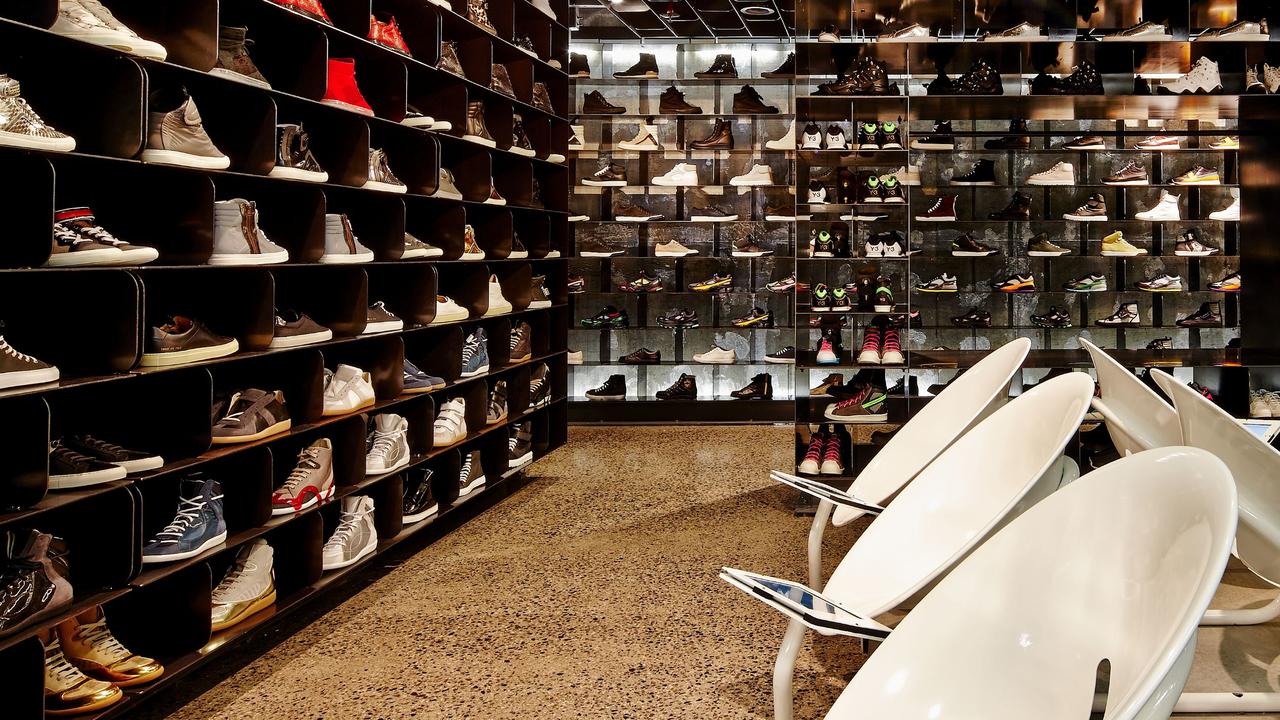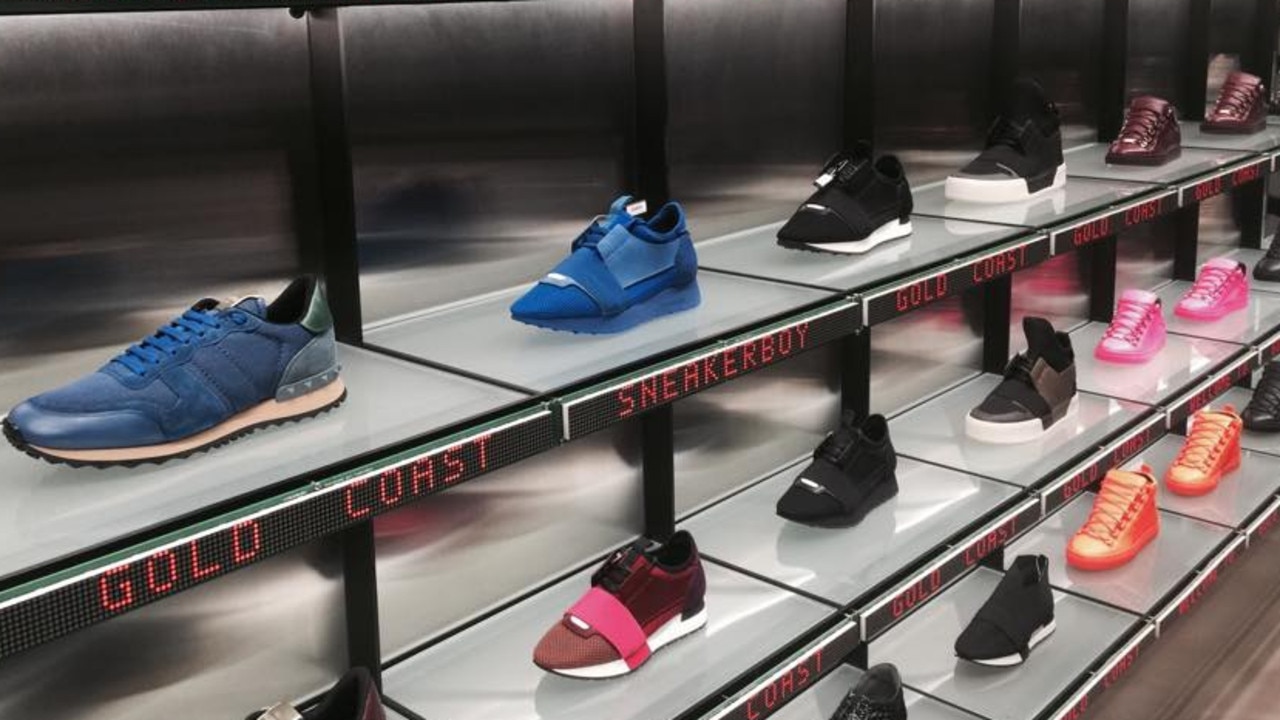’More pain to come’: What caused footwear icon Sneakerboy’s shock collapse
Australia’s struggling retail sector was dealt a major blow yesterday when an iconic name collapsed – and experts warn there’s “more pain to come”.
Shoe lovers are reeling from luxury shoe retailer Sneakerboy’s shock collapse – and now, attention is turning to what really went wrong for the brand.
News broke on Tuesday afternoon that the business, which sells high-end brands like Balenciaga and Canada Goose with four-figure price tags, had entered voluntary administration.
The move was confirmed in a notice of appointment released by the Australian Securities and Investments (ASIC) on Saturday, with Stephen Dixon from insolvency firm Hamilton Murphy Advisory chosen as administrator.
Five companies were included on the notice, Sneakerboy Pty Ltd and two related companies under the Sneakerboy name, and Luxury Retail Treasury Pty Ltd and Sneakerboy’s parent company Luxury Retail Group Pty Ltd.

“Sneakerboy today announced that Stephen Dixon of Hamilton Murphy Advisory has been appointed as voluntary administrator,” Hamilton Murphy Advisory said in a statement.
“The voluntary administration appointment has been made due to short term financing difficulties being experienced by the company.
“The difficult but prudent decision has been made to initiate the voluntary administration process. The administrator will now assess the ongoing viability of the business as he assesses the ability of the companies to continue to operate as a going concern.”
But what really went wrong for the retailer?
Sneakerboy’s controversial past
The collapse comes after the company was hit by a string of more than 10 wind up orders over the last three years.
In April this year, MP Pacific Fair, operators of the Gold Coast Pacific Fair shopping centre, where Sneakerboy previously had an outlet, filed a winding up order in the Queensland Supreme Court.
The Herald Sun reported at the time that Pacific Fair was pursuing Sneakerboy for $300,000 in unpaid rent.
Last March, footwear juggernaut Adidas also filed a winding up order, while the Victorian State Revenue Office sought a wind up order of its own in April 2020.
It’s also not the first time Sneakerboy has faced collapse, with the company falling into voluntary administration in 2015 over “conflicting interests of director and shareholders” before being saved by a last-minute sale.
News.com.au contacted Sneakerboy for comment.
Brands ‘in trouble’
While the specific details of Sneakerboy’s collapse are not yet known, it comes amid a perilous time for retailers.
Retail analyst Geoff Dart, of DGC Advisory, told news.com.au that as the Australian economy was hit by falling consumer sentiment, soaring interest rates and cost of living pressures, more retailers would fall.
And he said that as a luxury retailer that didn’t have the benefit of an “established name”, Sneakerboy had been especially vulnerable to current conditions.
“I think fringe players and transient brands that don’t have that established name – like Sneakerboy – could be in trouble,” Mr Dart said.

“In hard times, people tend to go for security and established brands, and also retailers with a good omnichannel set up that can also deliver online.
“If you look at household income, expenses are still far ahead of income, and interest rate hikes will only make things worse along with wage compression – we’re seeing no real wage increase, and people tend to keep their savings for a rainy day. In my view, people are reluctant to spend in tough times.”
Mr Dart said high-end retailers could be among the hardest hit.
“People are cutting back on luxuries and discretionary spending on things they don’t need,” he explained.
“It was already taking a hit even when Covid started, there had been the sharpest decline of discretionary spending with the lowest levels on record, and when you’ve got the cost of everything going up like petrol, food and mortgage, there are so many other priorities and people go for value brands.”
And Mr Dart warned there would be “more pain to come” for Aussie retailers, explaining that many would be forced to reduce their ranges to cut costs as the economy stalled.
Meanwhile, Jam Pathirana, founder and CEO of B dynamic Logistics, said that while online retailers enjoyed a period of extraordinary sales and growth during the pandemic, the latest challenges facing businesses have turned the tables very quickly, with many retailers now struggling to find staff, cope with rising costs and meet the soaring expenses associated with deliveries for their online sales.
“The cost of doing business, especially if you are an online retailer, has skyrocketed. The cost of labour has increased, if you can find people to do the work, and the cost of picking, packing and posting has increased especially if you are undertaking these activities in-house,” Mr Pathirana said.
“Many online retailers will find it difficult to cope if costs keep rising. It takes a lot of people and a lot of time to pack and ship products to customers.
“Add to this the rising cost of shipping and then having to manage returns. Many online retailers are going to struggle.”






